高一英语情态动词课件
合集下载
情态动词讲解精ppt课件

例句
will/would
详细描述:will 表示现在的意愿或 预测,would 表示过去的或虚拟 的意愿或预测。
1. I will help you with your project.(我会帮助你完成你的项 目。)
总结词:表示意愿或预测
例句
2. They would have gone to the party if they had known about it earlier.(如果他们早点 知道,他们就会去参加聚会。)
表示意愿
情态动词+动词原形,如 would like to go,表示 某人想要去。
形式变化
基本形式
情态动词的基本形式包括 现在时、过去时和将来时 。
过去式
情态动词的过去式通常是 在基本形式后面加-d或ed,如could have done 、should have done等。
将来时
情态动词的将来时通常是 在基本形式后面加-will或shall,如will be able to 、shall have to等。
may与might的区别与联系
总结词
may表示现在的许可或可能性;might表示过去的可能性或许可。
详细描述
may用于肯定句中,表示许可或可能性,例如“You may use this room.”(你可以使用这个房间。 )“The book may be in the library.”(这本书可能在图书馆里。)might表示过去的可能性,常 用于过去时态的句子中,例如“He might come tomorrow.”(他明天可能来。)
未必、很难说
She might not agree with us.
表示虚拟语气
will/would
详细描述:will 表示现在的意愿或 预测,would 表示过去的或虚拟 的意愿或预测。
1. I will help you with your project.(我会帮助你完成你的项 目。)
总结词:表示意愿或预测
例句
2. They would have gone to the party if they had known about it earlier.(如果他们早点 知道,他们就会去参加聚会。)
表示意愿
情态动词+动词原形,如 would like to go,表示 某人想要去。
形式变化
基本形式
情态动词的基本形式包括 现在时、过去时和将来时 。
过去式
情态动词的过去式通常是 在基本形式后面加-d或ed,如could have done 、should have done等。
将来时
情态动词的将来时通常是 在基本形式后面加-will或shall,如will be able to 、shall have to等。
may与might的区别与联系
总结词
may表示现在的许可或可能性;might表示过去的可能性或许可。
详细描述
may用于肯定句中,表示许可或可能性,例如“You may use this room.”(你可以使用这个房间。 )“The book may be in the library.”(这本书可能在图书馆里。)might表示过去的可能性,常 用于过去时态的句子中,例如“He might come tomorrow.”(他明天可能来。)
未必、很难说
She might not agree with us.
表示虚拟语气
高中英语情态动词精品PPT课件

— Might I watch TV after supper? — Yes, you ________. A. may B. must C. might D. could
.
11
3.表推测,表示主观上的推测,“可能,
也许”,不用于疑问句, might比
may的可能性更小
She may not like this place.
—Yes, he _______. A. need B. must C. may D. will
.
15
2. must表示肯定的推测。 The light is still on, so he must be at home.
Look at his new car. He ______ have a lot of money. A. should B. shall C. may D. must
I can’t believe my eyes. Such well-educated
gentleman ____ behave like this!
A.will B. would C. should D. must
What time ought I _______?
A.arrived
B.arriving
C.arrive
D.to arrive
He _______ speak to his mother like that. A.ought not to B.doesn’t ought to C.not ought to D.ought to not
.
22
1. should= ought to 表示劝告,建议,意 为“应该”, ought to 语气更强些,强调“有责任,有 义务做”
高中英语情态动词 课件(共22张PPT)

A. could have led B. would lead C. should have led D. must lead
【答案】A
情态动词
考点链接
请用合适的情态动词及括号内所给动词的适 当形式填空。
(1)—Tom graduated from college at a very young age.
2. He might have given you more help, but he was busy then.
情态动词
3. He abandoned a career that ______ to his becoming one of the most influential people in the world.
【答案】C
情态动词
1. Since this road is wet and slippery this morning, it _____ last night.
A. Must rain B. was raining C. Must have rained D. may rain 【答案】C
2. I believe he _____ an accident, otherwise he would have arrived on time.
(3)—Need I go with you to the office? (肯定回答)
—____________. 【答案】 Yes,you must
情态动词
(4)—Might I have talk with you this evening?(肯定回答) —____________. 【答案】 Yes,you can/may
A. to report B. to have reported C. to reporting D. have reported 【答案】B
【答案】A
情态动词
考点链接
请用合适的情态动词及括号内所给动词的适 当形式填空。
(1)—Tom graduated from college at a very young age.
2. He might have given you more help, but he was busy then.
情态动词
3. He abandoned a career that ______ to his becoming one of the most influential people in the world.
【答案】C
情态动词
1. Since this road is wet and slippery this morning, it _____ last night.
A. Must rain B. was raining C. Must have rained D. may rain 【答案】C
2. I believe he _____ an accident, otherwise he would have arrived on time.
(3)—Need I go with you to the office? (肯定回答)
—____________. 【答案】 Yes,you must
情态动词
(4)—Might I have talk with you this evening?(肯定回答) —____________. 【答案】 Yes,you can/may
A. to report B. to have reported C. to reporting D. have reported 【答案】B
高中情态动词课件大全

情态动词
不表示推测
表示推测
can could may might shall should must will would ought to
have to dare (daren’t) need (needn’t) used to
相当于情态动词的 have to, used to
可情态可实义的 need, dare/dared
情态动词有一定的意义,但没有人称和数的变化,不能独立使用,它和后面的动词构成谓语.
只作情态动词的 can/could, may/might, ought to, must
可情态可助动词的 shall/should, will/would
用于祈使句,表示祝愿。
表示推测——情态动词的重要用法.
肯定的推测 可能的推测 否定的推测 疑问的推测
must
对将来 对现在 对过去
情态动词
may, might
can’t, couldn’t
can, could
+ V. + V. + have done 常见must be + be doing
must 表示推测时, 只能用于肯定句。 e.g.这个电脑肯定出了问题。
You have worked hard all day. You must be tired.
must
There must be something wrong with the computer. 你努力学了一整天, 一定累了吧
3.can/could have done “本可以,本来可能已经”用于肯定句中,表示对过去发生的事情做出的判断. e.g.你本来可以考的更好。 You could have had a better mark.
高中英语情态动词各种用法课件(共47张PPT)

一 、表能力 :表现在的或一般的能力:表示 现在的或一般的能力用can 或 be able to. 一 般的能力是指你无论什么时候做什么事情就 能做到的能力。表示现在的能力或一般的能 力时,can比be able to 更普遍。
A computer can’t think for itself; it must be told what to do. (表示一般的能力)
This can’t / couldn’t be done by him. (表示不 相信)
He could be on his way home now. (could 不 如 may / might常用)
Can this be done by him? (表示一种疑惑、 惊讶)
(3)would, could, should, might 并不一定 与过去的时间有关,而是表示可能性弱于他 们相应的现在形式。如:
do something / succeeded in doing sth.
The fire spread through the hotel very
quickly but everyone was able to get out. (过去有能力并成功地做了某事)
(3) could have + 过去分词,表示过去有 能力做但未做。
表示对过去已经发生的行为进行推测,意为 “想必 / 准是/ 一定做了某事
It must have rained last night, for the road was quite muddy.
The lights were out. They must have been asleep.
2. can have done
高一英语下情态动词ppt课件
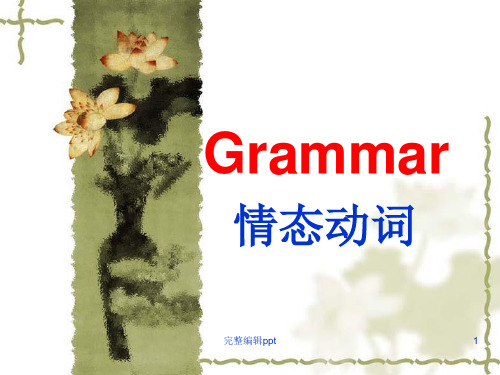
1.We must have learned 2,000 words by the end of last term. 到上学期为止我们一定学了有两千个单词 。
2.He must have gone to Beijing. 他一定已经去北京了。
完整编辑ppt
4
•can/could+have done表示对过去
2. You might have come earlier. 你本可以早点来的。(但没有这样)
完整编辑ppt
8
needn’t +have done表示做了本 来不必去做的事。
1.She needn’t have gone to the station yesterday. 昨天她本不必到火车站去的.(昨天她去了) 2.You needn’t have bought it. 你本可不必买它的。 (你买了)
2.---Why hasn’t Jane arrived yet?
---She __B__ again in the morning? A. shouldn’t have overslept
B. may have turned off the alarm clock
C. must have no one t o call her
可兼做行为动词的情态动词:need 、 dare
1.作为情态动词用,常用在否定句和疑问句中。 Dare (need) +S +V S + daren’t (needn’t) +V
I daren’t walk through the forest at night. Dare you walk through the forest at night? You needn’t return the book now. Need he go yesterday?
情态动词讲解_高一ppt
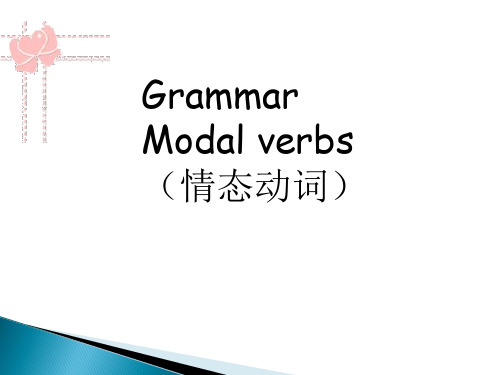
(2)对已发生的情况的推测:
结构:can’t/couldn’t +have done
1.表示请求,许可,常译为“可以”
You may take this seat if you like.如果你喜欢你可 以做在这。 May/Can/Could/Might I have a talk with you ? ------May/Might I come into the room to see my mother? ------No, you mustn't. She needs to have a good rest.
否定回答:I'm sorry, I can't.对不起,不 行。 No, thank you. No , I won't. 2. will和would 可表示意志,愿望和决心, 用于各种人称陈述句 I will do anything for you. They would not let him in because he was poorly dressed.
Grammar Modal verbs (情态动词)
How many modal verbs
do you know?
1 can / could / be able to
2 may/might 3 must / have to 4 shall / should 5 will / would 6 need / dare
will 和 would 1. will 和would 可用于第二人称疑问句,表示 请求和建议等。would比will婉转 Will you have some tea? Would you pass this book to the student in the last row? 必背: Will/Would you......?表示请求和建议的答复 肯定回答Yes, please. 是的,请。Certainly.当 然可以 Sure.当然了。 All right. 好啊
高中英语情态动词PPT课件
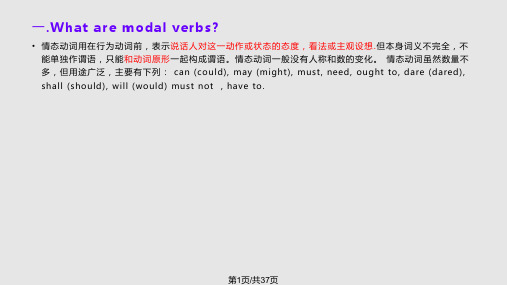
第11页/共37页
very uncertain
almost certain
might may could (can) should ought to will must
1.He _____ be at home.
A.may B.might C.must
2.He _____ be at home, for he just called me from his home 15 seconds ago.
Would rather…
第20页/共37页
will/would:
2.表示意志、愿望和决心。 有愿意,要的意思,will指 现在,would指过去的习惯 性动作或倾向。
I will never do that again.
I would go there with you.
第21页/共37页
will/would:
can表示与生俱来的能力或一种客观可能,而 be able to更加强调通过后天的学习和努力获 得的能力,或者在某个客观的场合和背景下, 能做到的事情。
第8页/共37页
advisability
necessity
ought to/should
have to
must
Your mother brings you up and takes good care of you, so when she is old, you ___ look after her in return.
第15页/共37页
4.Permission(允许) may/might:
1. 表示许可,常译为可以。表示请 求、允许时,might比may的语气 -更Mi委gh婉t/一M些ay。I use your computer? - Yes, you can. /No, you can’t/mustn’t.
very uncertain
almost certain
might may could (can) should ought to will must
1.He _____ be at home.
A.may B.might C.must
2.He _____ be at home, for he just called me from his home 15 seconds ago.
Would rather…
第20页/共37页
will/would:
2.表示意志、愿望和决心。 有愿意,要的意思,will指 现在,would指过去的习惯 性动作或倾向。
I will never do that again.
I would go there with you.
第21页/共37页
will/would:
can表示与生俱来的能力或一种客观可能,而 be able to更加强调通过后天的学习和努力获 得的能力,或者在某个客观的场合和背景下, 能做到的事情。
第8页/共37页
advisability
necessity
ought to/should
have to
must
Your mother brings you up and takes good care of you, so when she is old, you ___ look after her in return.
第15页/共37页
4.Permission(允许) may/might:
1. 表示许可,常译为可以。表示请 求、允许时,might比may的语气 -更Mi委gh婉t/一M些ay。I use your computer? - Yes, you can. /No, you can’t/mustn’t.
高中英语语法情态动词(28张PPT)-经典通用课件资料

2021/10/10
19
4. Tom ought not to ___ me your secret,
but he meant no harm.
A. have told
B. tell
C. be telling
D. having told
答案A 由于后句为过去时,告诉秘密的动作又发生在其前因,此地应用过去完成时,但它在情态动词 ought to 后,所以用have。
Must I go there in person? 我必须亲自去吗? We must always follow the Party.我们要永远跟着党走。 ②表示“必然”
All men must die.人总是要死的。 ③表示推测,“准是”、“一定”,否定形式为can’t
She must be at home now.她现在准在家。
- May I come in? -Might I go to the hospital to see my father? ②否定形式为may not, 但表示“不可以”或“禁止”时用must not (mustn’t). e.g.-May I watch TV now?我现在可以看电视吗? -No, you mustn’t. 不,你不可以看。 ③ may, might还可以表示推测,但might可能性比may 小。 e.g. There may be a few copies left in the bookstore. 书店里可能还有几本书。 They might have been killed by radiation. ④may 放在句首, 表示祝愿。 e.g. May God bless you!
e.g. You don’t have to tell him about it. 你没必要把此事告诉他。
高中英语语法 情态动词用法总结(20张PPT)-经典通用课件资料
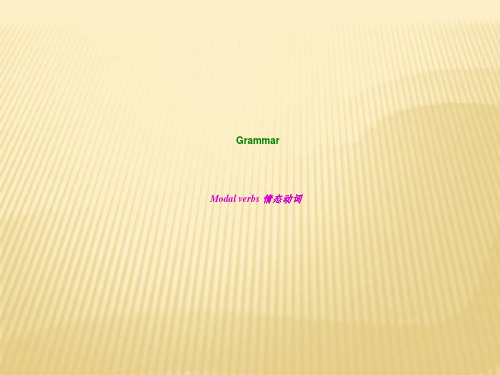
A. could B. would C. should D. might
C
2. What do you mean, there are only ten tickets? There_____
A. should CA. will
B. would D. shall
be twelve.
2021/10/10
13
5. must
1. 表示义务或强烈的劝告,意为“必须”“应该”, 其否定式表示“不应该”“不许可” “不准”“禁止”。
Eg: 1) You must finish your homework first. 2) Children mustn’t speak like that to their parents.
3. 表推测,用于肯定句,意为“一定”“务必”。
Eg: 1) Betty must be in the next room. 2) He must be watering the flowers in his garden.
2021/10/10
14
Complete the following sentences using modal verbs.
5) Can/Could I use your dictionary? 6) Could you lend me a hand?
3. 表示“请求” “允许”(表请求时,口语中常用 could 代替 can 使语气更委婉,回答时用can)
2021/10/10
4
4. 表示“许可”,可与may 换用。 You can go home now.
1. 表“请求、建议”等,用 would 比用will 委婉,客气些 Eg: 1)Will you lend me your book? 2) Would you like a cup of tea?
高一上学期英语课件:情态动词 (共20张PPT)
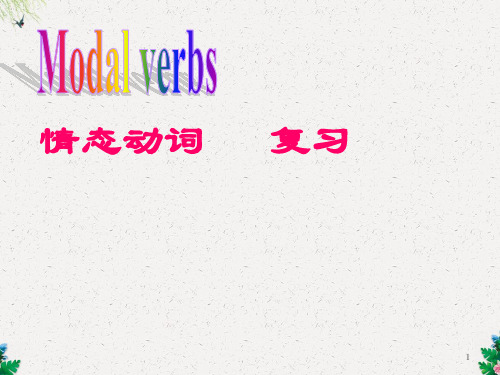
How old can he be ?. (他可能多大了?)
He may be a teacher.
(他可能是老师) He may or may not be 33. (他或许是或许不是33岁)
He must be 33. (他一定33岁) 3
1. Mary ____ be in Paris,for I saw her in
time. 他们这时该已到北京了。
8
• 解答情态动词表示猜测的试题时,一 要清楚被猜测的时间,二要清楚有无 客观事实根据。若有客观事实根据, 则无论是肯定还是否定的猜测,猜测 语气最强且符合时间要求的为最佳答 案;若无客观事实根据,纯凭主观臆 断则猜测语气最弱且符合时间要求的 为最佳答案。
• 情态动词表示猜测时语气从强到弱的 顺序是:must,should,can,may, could,might。
情态动词 复习
1
1 情态动词表示推测的用法
情态动词must,can,could,may,might都可 用来表示推测
1. must所表示的可能性最大,最有把握,意 为“一定”。 2. can和could主要用于否定句和疑问句中 ,“可 能”,can’t或couldn’t 表示“不可能”
3. may 和 might表示现在或将来可能发生的动作 或情况,意为“或许,可能”主要用于肯定句 中,might相对于may 来说,表示的可能性更小一 些。may/might not “可能不”
19
Goodbye!
20
1. They will ______ run this machine on
their own in three months.
A. can
B. could
He may be a teacher.
(他可能是老师) He may or may not be 33. (他或许是或许不是33岁)
He must be 33. (他一定33岁) 3
1. Mary ____ be in Paris,for I saw her in
time. 他们这时该已到北京了。
8
• 解答情态动词表示猜测的试题时,一 要清楚被猜测的时间,二要清楚有无 客观事实根据。若有客观事实根据, 则无论是肯定还是否定的猜测,猜测 语气最强且符合时间要求的为最佳答 案;若无客观事实根据,纯凭主观臆 断则猜测语气最弱且符合时间要求的 为最佳答案。
• 情态动词表示猜测时语气从强到弱的 顺序是:must,should,can,may, could,might。
情态动词 复习
1
1 情态动词表示推测的用法
情态动词must,can,could,may,might都可 用来表示推测
1. must所表示的可能性最大,最有把握,意 为“一定”。 2. can和could主要用于否定句和疑问句中 ,“可 能”,can’t或couldn’t 表示“不可能”
3. may 和 might表示现在或将来可能发生的动作 或情况,意为“或许,可能”主要用于肯定句 中,might相对于may 来说,表示的可能性更小一 些。may/might not “可能不”
19
Goodbye!
20
1. They will ______ run this machine on
their own in three months.
A. can
B. could
高中英语情态动词课件
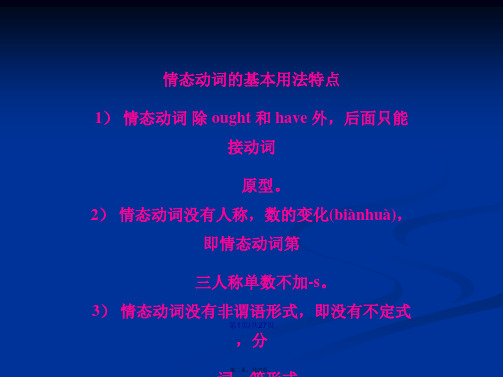
第7页/共27页
第八页,共27页。
3 must 语 have to 的 用法(yònɡ fǎ)
1 You must come to school on time . You mustn't waste any more time(必须(bìxū),禁止)
2 Must I come back before ten ?
第15页/共27页
第十六页,共27页。
You ought to have helped him with hisCEnglish, ____you ?
A. won’t you B. ought not you C. shouldn’t you D. wouldn’t you
第16页/共27页
第5页/共27页
第六页,共27页。
2 may / might
1 May I watch Tv after supper? Yes you may /No ,you mustn't.(请求(qǐngqiú)许可 2 It may be true ./ she may come tomorrow / He might have some fever(推测) 3 May you succeed ! May you have many more days as happy as this one(祝愿)
第十五页,共27页。
------When can I come for the photos ? I need them tomorrow afternoon.
-----They ___B__be ready by 12 : 00 . (
A. can
B. should
C. might D. need
第八页,共27页。
3 must 语 have to 的 用法(yònɡ fǎ)
1 You must come to school on time . You mustn't waste any more time(必须(bìxū),禁止)
2 Must I come back before ten ?
第15页/共27页
第十六页,共27页。
You ought to have helped him with hisCEnglish, ____you ?
A. won’t you B. ought not you C. shouldn’t you D. wouldn’t you
第16页/共27页
第5页/共27页
第六页,共27页。
2 may / might
1 May I watch Tv after supper? Yes you may /No ,you mustn't.(请求(qǐngqiú)许可 2 It may be true ./ she may come tomorrow / He might have some fever(推测) 3 May you succeed ! May you have many more days as happy as this one(祝愿)
第十五页,共27页。
------When can I come for the photos ? I need them tomorrow afternoon.
-----They ___B__be ready by 12 : 00 . (
A. can
B. should
C. might D. need
高一英语语法情态动词[公开课件]
![高一英语语法情态动词[公开课件]](https://img.taocdn.com/s3/m/a6705109dcccda38376baf1ffc4ffe473368fdec.png)
Revision: Can I watch TV? May I watch TV? Must I watch TV? Need I watch TV?
1. can和could
Some of us can use the computer now, but we couldn’t
last year.
He daren’t to speak English before such a crowd, did he?
He daren’t speak English before such a crowd, dare he?
Nobody need to be afraid of catching the disease. Nobody need be afraid of catching the disease.
Note:
表示特定的某一过去能力或表示成功地做 了某事时,只能用was/were able to, 不 能用could。
He w__a_s_a_b_l_e_t_o flee Europe before the war broke out.
1.A big fire broke out in ABC hotel yesterday. Luckily, everyone __w_a_s_a_bl_e_t_o_ run out of the building.
You shall be punished for what you've done.
5.will/would
I told him not to go, but he would not listen. He would go in spite of our warnings. He would sit for hours doing nothing. I would be about ten when my brother left home. They would have been killed if the car had gone
1. can和could
Some of us can use the computer now, but we couldn’t
last year.
He daren’t to speak English before such a crowd, did he?
He daren’t speak English before such a crowd, dare he?
Nobody need to be afraid of catching the disease. Nobody need be afraid of catching the disease.
Note:
表示特定的某一过去能力或表示成功地做 了某事时,只能用was/were able to, 不 能用could。
He w__a_s_a_b_l_e_t_o flee Europe before the war broke out.
1.A big fire broke out in ABC hotel yesterday. Luckily, everyone __w_a_s_a_bl_e_t_o_ run out of the building.
You shall be punished for what you've done.
5.will/would
I told him not to go, but he would not listen. He would go in spite of our warnings. He would sit for hours doing nothing. I would be about ten when my brother left home. They would have been killed if the car had gone
